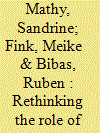| Srl | Item |
| 1 |
ID:
094299


|
|
|
|
|
| Publication |
2010.
|
| Summary/Abstract |
The aim of this article is to analyze the potential for synergies between climate policies and development in a case study on India focusing on the power sector sub-optimalities. To do so, we use Imaclim-R, a dynamic recursive energy-economy model that represents a second best world with market imperfections and short-run adjustments constraints along a long-term growth path. The analysis suggests (i) global carbon pricing induces prohibitive macroeconomic costs for the Indian economy, even in the case of significant financial transfers associated with a global cap-and-trade system and a 'Contraction and Convergence in 2100' allocation scheme and (ii) the most cost efficient climate policies are not uniform carbon pricing only. The implementation of domestic policies suited to the national context, for instance targeting sub-optimalities in the power sector for India, allows reducing significantly the macroeconomic costs induced by international mitigation policies.
|
|
|
|
|
|
|
|
|
|
|
|
|
|
|
|
| 2 |
ID:
137690


|
|
|
|
|
| Summary/Abstract |
This article considers the usefulness of low-carbon scenarios in public decision-making. They may be useful as a product-oriented trajectory. The scenarios on the agenda of the 2013 Energy Debate in France belong to this category. But a scenario may also be process-oriented, in the sense that its scripting process helps build consensus and a minimum level of agreement. We have scripted scenarios using a codevelopment method, involving about 40 stakeholders from the private and public sectors, and from the state: NGOs, consumer groups, trade unions, banks and local authorities. They selected policies they considered acceptable for achieving 75% greenhouse gases emission reductions in 2050. These policies were then integrated in the Imaclim-R-France technico-economic simulation model, as part of a high or moderate acceptability scenario. In the first case emissions were cut by between 58% and 72% by 2050; in the second case by between 68% and 81%, depending on the energy price assumptions. All these measures benefited jobs and economic growth, swiftly and durably cutting household spending on energy services. This offers a solid basis for gaining acceptability for low carbon trajectories; the process constitutes also a framework for consolidating collective learning centering on the acceptability of climate policies.
|
|
|
|
|
|
|
|
|
|
|
|
|
|
|
|